Echo Park Lake encampment is gone. So is the fence. The controversy now? Geese
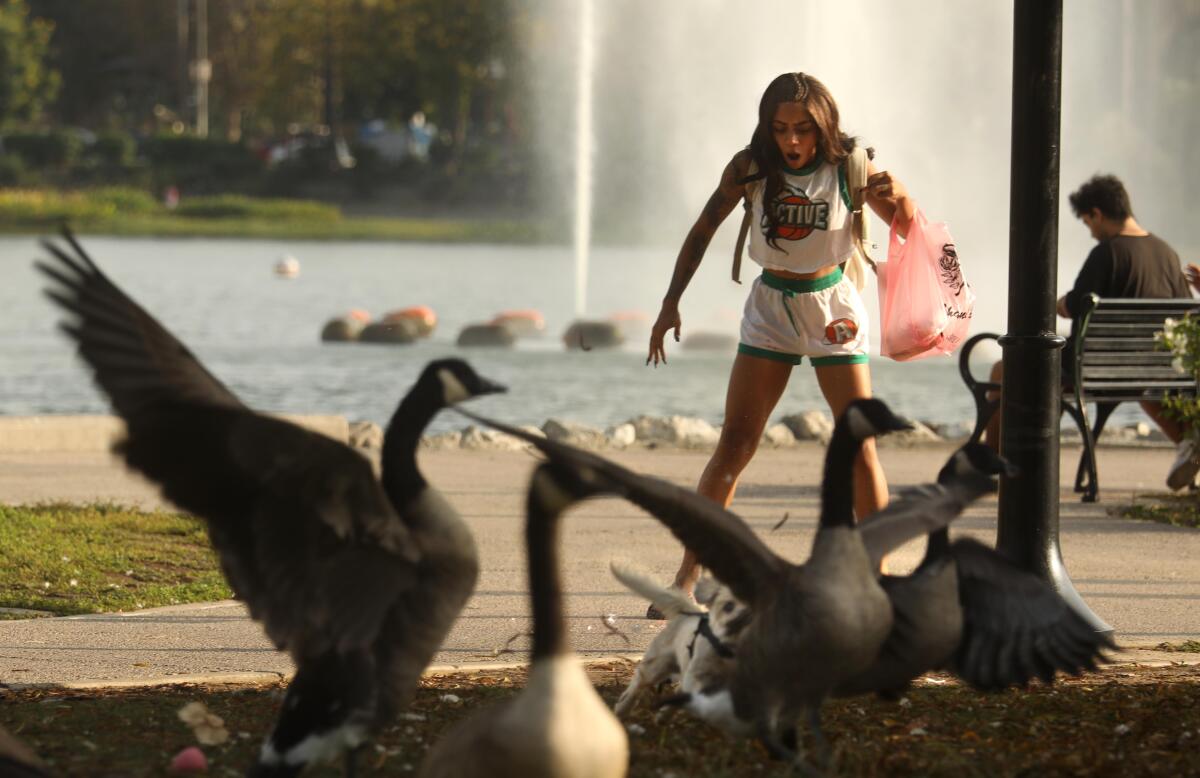
- Share via
First, the tents had everyone up in arms.
Two years ago, more than 170 tents or makeshift structures encircled Echo Park Lake, a beloved Los Angeles landmark that had became a sprawling homeless encampment.
Then, everyone was in fisticuffs over the fence.
After city workers in 2021 cleared the encampment — with protesters clashing with police nearby — construction crews erected an ugly chain-link fence that stood around the park until March.
Some nearby residents who witnessed the shootings, fires, fights and late-night parties in the encampment said the fence was essential to restoring order. Critics said it made Echo Park Lake feel like a jail.
Now, the fence is gone. The tents are, too. And folks are complaining about something else entirely.
Geese.
Big, aggressive, loud, always-pooping Canada geese.
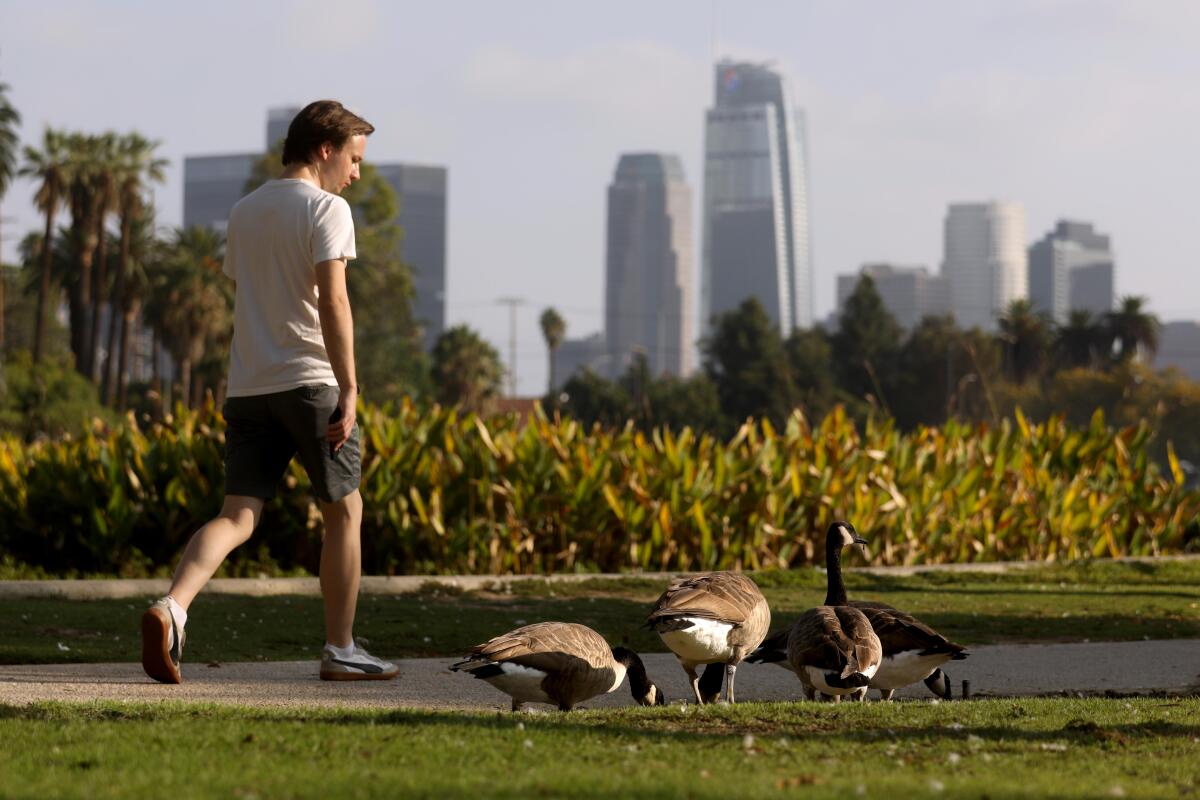
“I get a lot of emails — mainly now about the geese situation at the park,” Laila Molina, a field deputy for L.A. City Council District 13, told the Echo Park Neighborhood Council this summer when asked if there had been complaints about the chain-link coming down.
Councilman Hugo Soto-Martinez, who campaigned last year on removing the fence, said in a statement that he “knew that unless taking down the fence at Echo Park Lake was successful, my goose was cooked.”
“But luckily, the only geese I have to deal with now are alive.”
Canada geese — which average 3 feet in length from beak to tail — have flocked to Echo Park Lake for years. But lately, they’ve ruled the roost: charging yappy little dogs, scaring children, pooping all over the sidewalk, and pushing out other, smaller waterfowl.
They have wandered into surrounding streets, prompting people to fret on the app Nextdoor that the birds would get run over.
(“They have wings! Geese can fly!” countered one annoyed City Hall staffer who called the geese “the issue everyone is obsessed with.”)
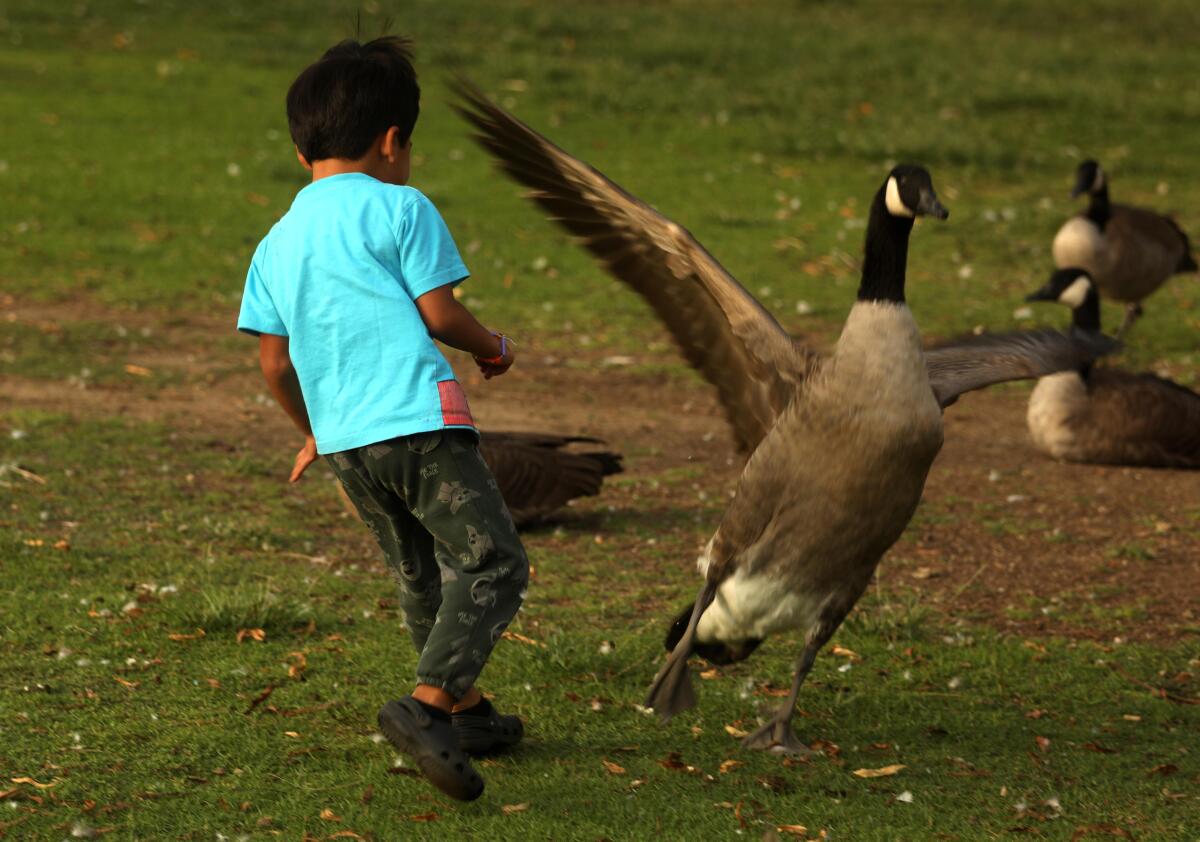
“They’re just proliferating. They’re basically feral. They’re not really wild,” said Jon Fisher, who writes a column, Birds of the Season, for the Los Angeles Audubon Society’s newsletter, the Western Tanager.
The majority of Canada geese are migratory, flying south in the winter and north to their breeding sites in the spring, making V-shaped formations in the sky.
But if they have everything they need — safety, food and places to nest — they don’t have much reason to leave, Fisher said.
They stay put, get fat, and don’t even wince when people and pets come close.
Nearly a dozen others have expressed interest in running for De León’s seat, which takes in all or part of downtown, Boyle Heights, El Sereno and Eagle Rock.
In L.A. County, Fisher said, Canada geese have laid claim to several parks and golf courses where they have lots of water and grass — sustenance. They’re all over Apollo Park in Lancaster and Legg Lake within the Whittier Narrows Recreation Area in South El Monte. And they have long been entrenched at Woodley Lakes Golf Course in Van Nuys.
Echo Park Lake, though, is smaller. Located in the middle of a densely populated neighborhood, with its postcard-perfect view of the downtown skyline, the park gets crowded. And its geese population has exploded over the last two years.
Fisher said it’s possible that the fence was a factor, protecting nests and goslings from predators such as coyotes.
This summer, more than 200 Canada geese swarmed the 29-acre park, said Thomas DeBoe, an attorney and former chairman of the Echo Park Lake Park Advisory Board.
At the pace they’ve been reproducing, “it will be 300 next summer,” he added.
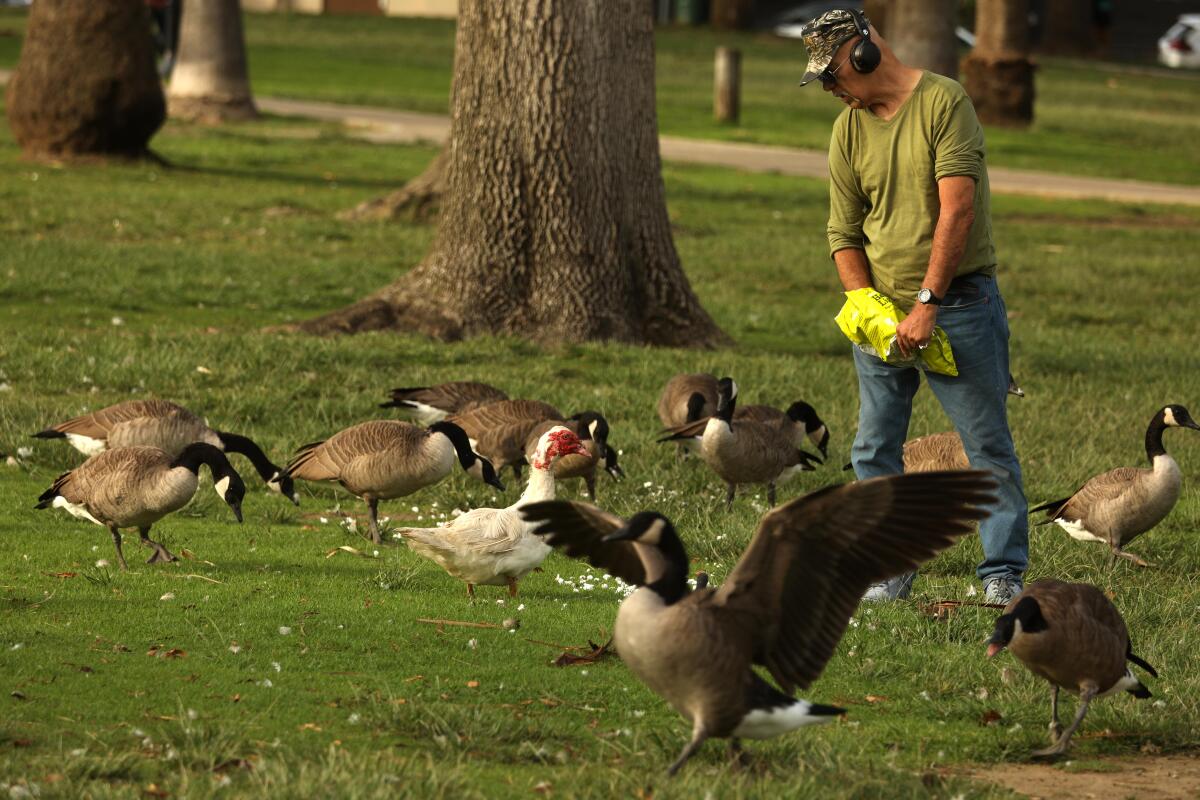
Over the last two years, their nests have increased near the park’s 4 acres of wetlands and on the island in the middle of the lake, DeBoe said.
The eggs hatch around March, and the birds get extra aggressive when protecting their goslings.
The geese are “a nuisance,” said DeBoe, who has lived in and around the neighborhood for decades. People with small dogs often pick them up and carry them so they don’t get attacked, and “the main problem is you can’t walk or enjoy the lake when you have to dodge poop,” he said.
DeBoe said that, despite complaints, the city’s parks and recreation department has not communicated what, if anything, it intends to do about the geese.
“They don’t seem willing to take input from the community,” he said. “They need to come up with a plan.”
The L.A. Department of Recreation and Parks did not respond to calls or emails seeking comment.
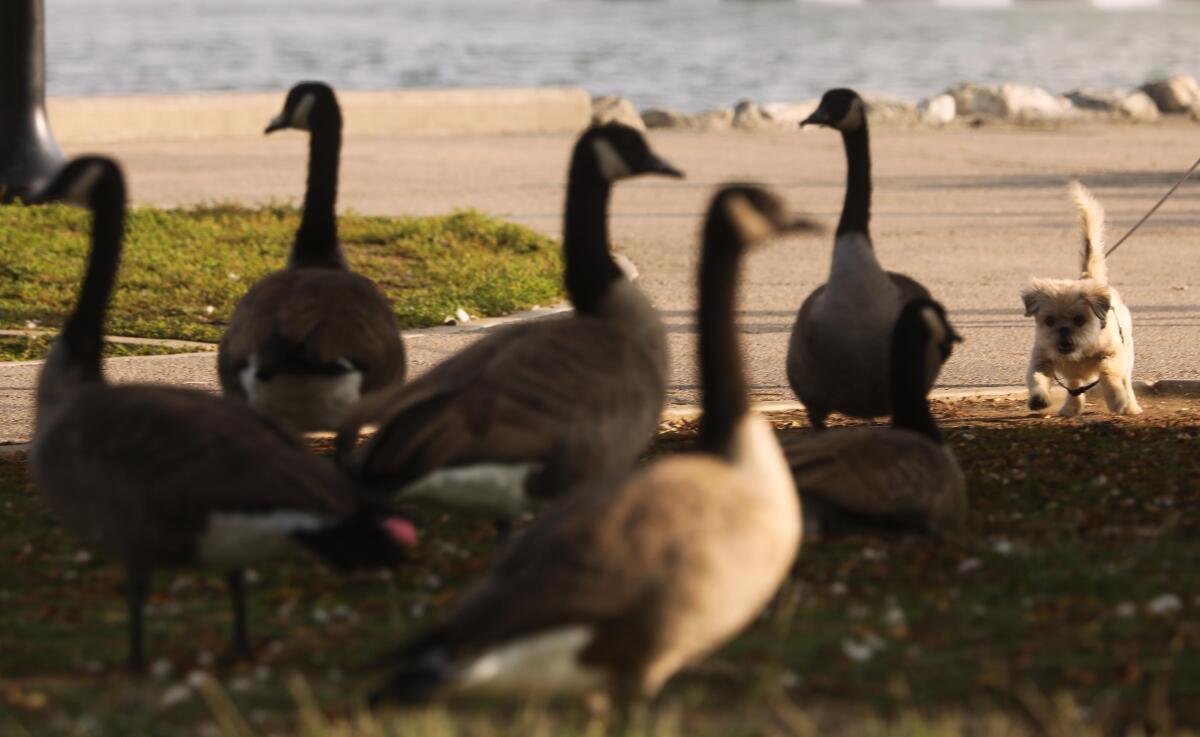
The city can’t just capture and move the geese. They might have worn out their welcome — but the honkers have rights.
Canada geese are not endangered, but they are federally protected.
For “resident” Canada geese — such as those at Echo Park Lake or those that lay their eggs on a homeowner’s lawn and won’t go away — a federal permit is required to remove nests and eggs, said Joanna Gilkeson, a spokeswoman for the U.S. Fish and Wildlife Service.
A federal permit also is required to capture, handle or kill any Canada goose, resident or migratory, outside an established hunting season, Gilkeson said.
Zyair Ayanna, a 22-year-old jazz singer who lives in nearby Historic Filipinotown, walks her dog, Milo, an 11-year-old Shih Tzu mix, around Echo Park once a week.
She recently moved to L.A. from Michigan, where she was used to seeing Canada geese flying overhead during migration. She was shocked by the L.A. birds’ aggression.
David Peralta’s foul ball barely missed a goose at Dodger Stadium, where in 2022 a goose sighting in the NLDS burst the Dodgers’ bubble. Did someone say bubble?
“I don’t want them to attack my little dog,” who has “little dog syndrome” and loves to puff up his tiny chest muscles, she said.
The geese “are like 10 times bigger. They just kind of square up on him. They don’t move when he goes at them.”
On a recent gray morning, dozens of geese circled the Lady of the Lake — the 1934 concrete statue of a woman with her hands raised forevermore — as people took selfies near her.
Nearby, they waddled around a man reading a book and smoking a joint on a bench on the west side of the lake.
Tanya Juarez and her friend Troy Medina sat on a bench, taking a gander at the paddle boats shaped not like geese, but like swans.
Juarez, 30, who owns a body waxing studio in West Hollywood, has been coming to Echo Park Lake since she was a child. There used to only be a few geese at a time, not hordes.
“People feed them all the time!” said Medina, a 38-year-old physical therapist who lives in Historic Fili-pinotown. It’s no wonder they stay, he said, laughing.
The geese, Juarez said, are far preferable to the fence.
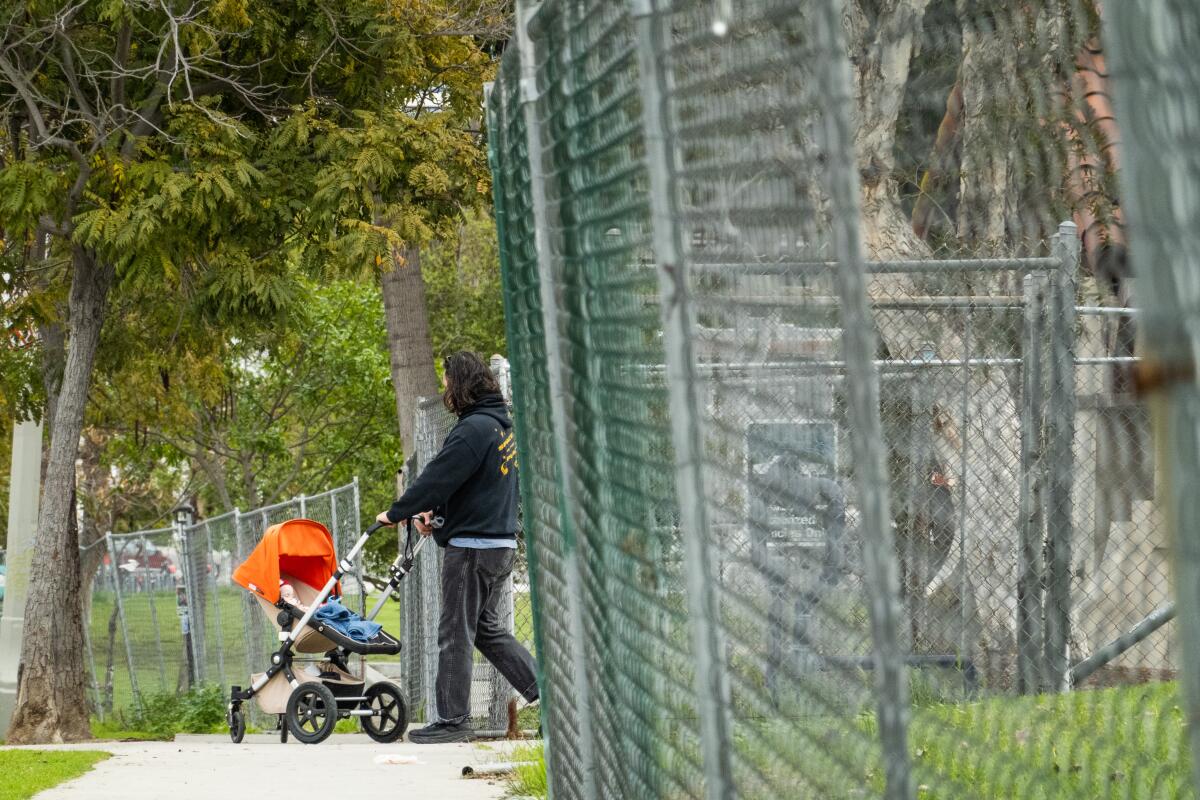
“It was ugly. It was sad,” she said of the structure.
As Esau Kingsland walked near the north end of the lake, his dog, Teddy — a year-old rescue mutt, part Old English sheepdog, with fluffy gray and white fur — jerked his leash, lunging and barking at a goose near the water’s edge.
The goose hissed. But didn’t move.
Kingsland, a set dresser, walked with Jennine Beltran, a production designer who held the leashes of Luke, another Old English sheepdog mix, and Betty, a tiny poodle and schnauzer mix.
The bigger dogs try to chase the birds into the lake, Beltran said. But Betty, the smallest, “couldn’t give a damn about these geese.”
Kingsland and Beltran said they were walking mid-morning on a weekday because their work has been affected by the Hollywood labor strikes. They love Echo Park Lake, but it’s become harder to keep the dogs from fowl play.
Kingsland said he wouldn’t mind if some of the neighborhood’s resident coyotes came in and dined on poultry.
“Go, coyotes!” he said.
“As long as they don’t get the dogs. Or the geese,” Beltran said.
“No!” Kingsland said, laughing. “You’ve got to have natural population control.”
More to Read
Sign up for Essential California
The most important California stories and recommendations in your inbox every morning.
You may occasionally receive promotional content from the Los Angeles Times.
















